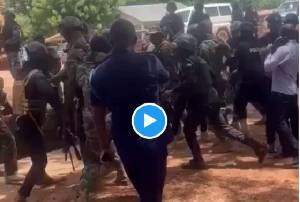Why Soldiers Intervened in a Gun Battle Between Police and Customs Officials at Bawku
In recent weeks, the city of Bawku in Ghana has been the center of a critical security incident that culminated in soldiers intervening in a violent gun battle between police and customs officials. This event highlights the complexities of law enforcement, inter-agency collaboration, and the ongoing security challenges in the region.
The Context of the Incident
Bawku, located in the Upper East Region of Ghana, has a history of ethnic tensions and clashes, particularly among various groups over control of resources and local governance. The recent incident was sparked by a confrontation between police and customs officials during a routine operation aimed at curbing smuggling activities in the area. Smuggling has been a persistent issue in Bawku, exacerbating local tensions and undermining the rule of law.
The confrontation escalated rapidly, leading to a significant exchange of gunfire. Witnesses reported that the situation became chaotic, with civilians caught in the crossfire, raising concerns for public safety and order. This prompted the need for intervention to restore peace and prevent further escalation.
The Role of the Military
The intervention of the military in this situation can be attributed to several factors. Firstly, the primary duty of the military is to maintain national security, which includes supporting law enforcement agencies during crises that threaten public safety. The escalation of violence between police and customs officials posed a significant risk not just to those directly involved but also to the local population.
Secondly, the military has resources and training that enable it to handle high-intensity situations more effectively than local police. The presence of soldiers helped to de-escalate the violence and regain control over the situation, allowing for a more coordinated response to the unrest. This intervention also served to reinforce the authority of the state in maintaining law and order.
Implications for Security and Governance
The incident raises critical questions about the collaboration between different arms of government and security agencies. The involvement of the military suggests a breakdown in communication and coordination among police and customs officials. Such a failure can exacerbate existing tensions, leading to mistrust and further violence.
Moreover, the event has prompted discussions about the effectiveness of current security strategies in Bawku and the broader implications for national security. The government may need to reassess its approach to managing inter-agency conflicts and enhance training programs to ensure that personnel are equipped to handle disputes without resorting to violence.
Conclusion
The gun battle between police and customs officials in Bawku and the subsequent military intervention highlight the challenges faced by law enforcement in Ghana. The complexities of inter-agency operations, the need for effective communication, and the importance of coordinated responses to crises are underscored by this incident. As Bawku continues to grapple with issues of security and governance, it remains imperative for the government to foster collaboration among its agencies to prevent such occurrences in the future. Only through effective cooperation and dialogue can the roots of conflict be addressed, paving the way for a more stable and secure environment for all residents.




No comments yet
Be the first to share your thoughts!